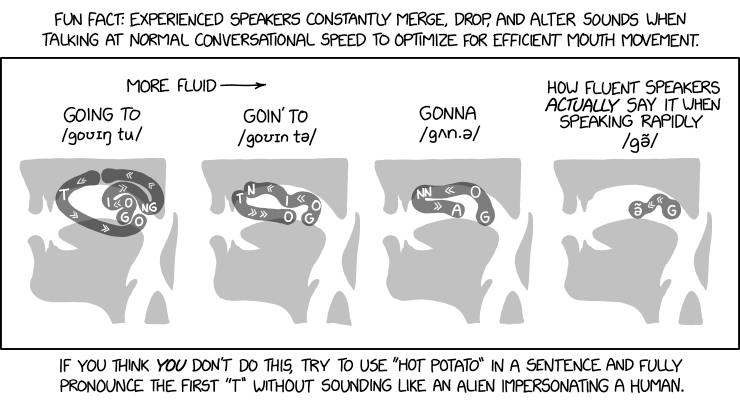this post was submitted on 06 Jun 2024
84 points (96.7% liked)
Linguistics
523 readers
94 users here now
Welcome to the community about the science of human Language!
Everyone is welcome here: from laymen to professionals, Historical linguists to discourse analysts, structuralists to generativists.
Rules:
- Stay on-topic. Specially for more divisive subjects.
- Post sources whenever reasonable to do so.
- Avoid crack theories and pseudoscientific claims.
- Have fun!
Related communities:
founded 10 months ago
MODERATORS
you are viewing a single comment's thread
view the rest of the comments
view the rest of the comments

Yes, they are! And the comic shows one - you can pretty much guess that the author is American due to the nasalisation in the last step, that is by no means as common as in, for example, Southern Standard British English.
Other examples in other languages would be:
Folks here in Southern Brazil, specially in the rural area, have a tendency to drop pre-stressed [e] in quick speech, for example rendering ⟨tesoura⟩ "scissors" as [tz̥o:ɾɐ]~[tz̥o:ɾä]. (I'm urban but I do this a lot too.) However, you typically don't see this happening among people from Northeast - even in quick speech they'll still render the same word as something like [tɪˈzowɾɐ].
On the other hand plenty of those Northeasterners debuccalise /v ʒ/ to [ɦ] in quick speech, but you don't typically see people doing it here. Here [ɦ] is basically for /r/ only.
Nowadays the Tuscan gorgia is phonologised for the Tuscan variety, like "gonna" is for English - in some situations, instead of producing an occlusive like [p t k], that variety "expects" a fricative like [ɸ θ h]. But originally in the Middle Ages it was a simple smoothing, it takes far less effort to near two articulators to each other, for a fricative, than to have them touching each other for the full occlusive. And yet you typically don't see people outside Tuscany doing this, even the ones who were raised exclusively with Standard Italian, thus have practically no interference from other local varieties.
Ha, in my original reply I'd started to contrast my SSB accent with American - I wouldn't go as far as the final panel, although I feel I'd understand it easily enough.
Also, even in SSB (as opposed to the more London Estuary type English), we use glottal stops a lot more than over the pond: /h ɔ́ ʔ p ə t ɛ́j t əw/